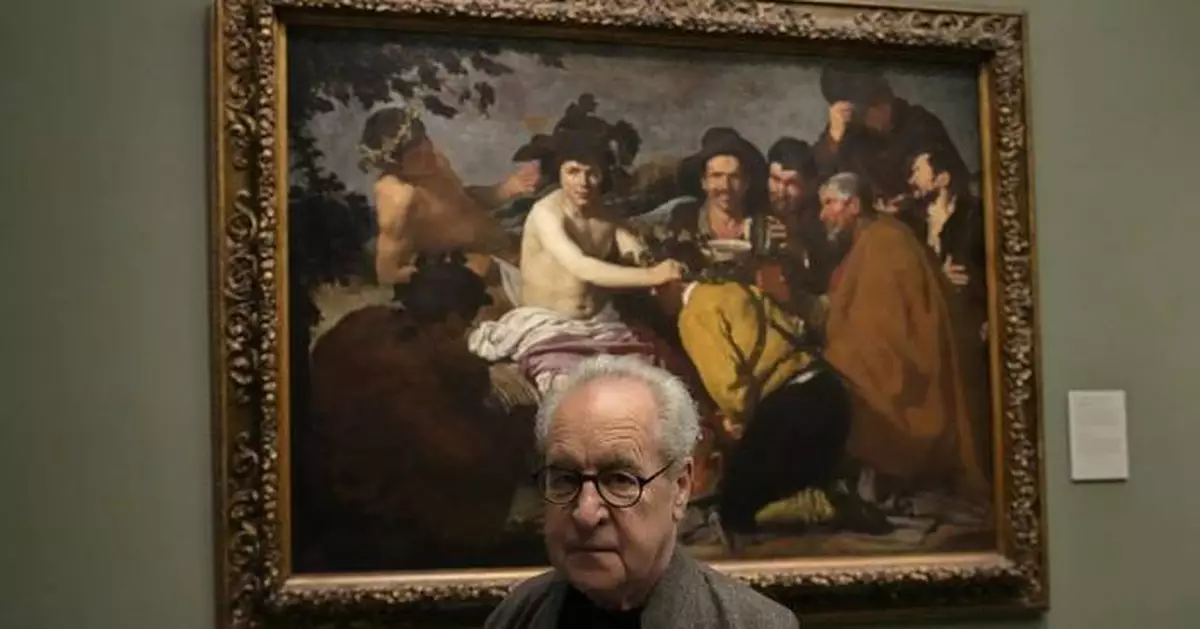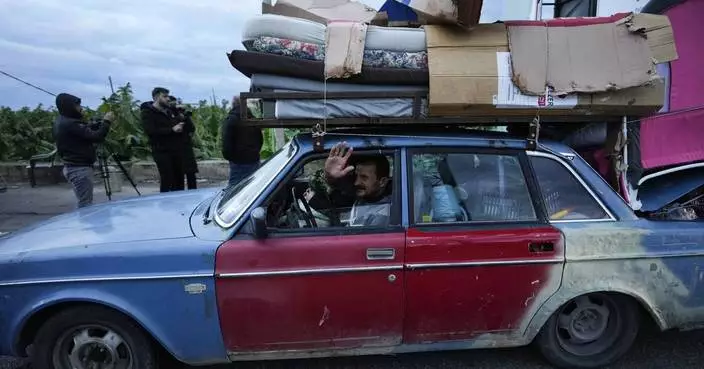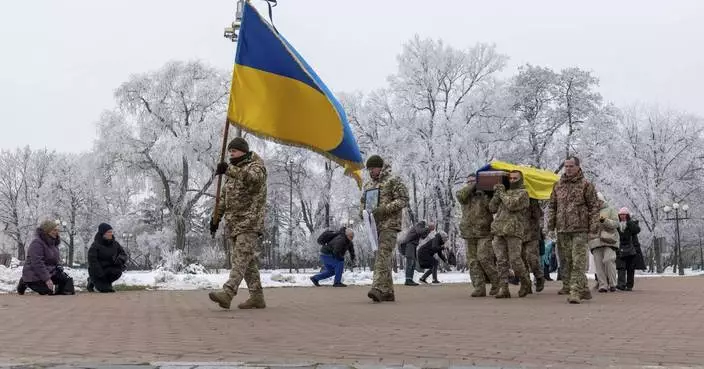MADRID (AP) — It’s the eyes peering from the canvases that get him, their gaze piercing the boundary between art and life.
That’s why acclaimed Irish novelist John Banville prefers to visit Spain’s Prado Museum during its opening hours — even though he's been invited to browse anytime as part of a month-long literary fellowship.
Click to Gallery
Novelist John Banville poses between Tiziano's 'Sisyphus' on left and Tityus on right at the Prado Museum in Madrid, Spain, Wednesday, Oct. 23, 2024. (AP Photo/Paul White)
Novelist John Banville walks around looking at paintings including 'Diego Velazquez's 'Las Meninas' in the background at the Prado Museum in Madrid, Spain, Wednesday, Oct. 23, 2024. (AP Photo/Paul White)
Novelist John Banville speaks during an interview with The Associated Press at the Prado Museum in Madrid, Spain, Wednesday, Oct. 23, 2024. (AP Photo/Paul White)
Novelist John Banville looks at 'Diego Velazquez's 'Las Meninas' at the Prado Museum in Madrid, Spain, Wednesday, Oct. 23, 2024. Banville has enjoyed unlimited access to Madrid's great El Prado museum for the past month as its latest writer-in-residence. (AP Photo/Paul White)
Novelist John Banville looks at Diego Velazquez's 'Vulcan's Forge' at the Prado Museum in Madrid, Spain, Wednesday, Oct. 23, 2024. (AP Photo/Paul White)
Novelist John Banville poses in front of Tiziano's 'The Emperor Charles V at Muhlberg' at the Prado Museum in Madrid, Spain, Wednesday, Oct. 23, 2024. (AP Photo/Paul White)
Novelist John Banville poses by Diego Velazquez's 'The Feast of Bacchus' at the Prado Museum in Madrid, Spain, Wednesday, Oct. 23, 2024. (AP Photo/Paul White)
Still, he doesn't want to be alone with the multitude of watchers hanging from the walls of the labyrinthine galleries.
“I don’t like coming here after hours, it’s too eerie. The pictures, they look at you,” Banville said turning away from the glare of Diego Velázquez himself looking down from the Spaniard's greatest work, “ Las Meninas.”
The huge 17th-century painting shows the Infanta Margarita, her young ladies-in-waiting, a dwarf, a buffoon with a dog, a nun, a mysterious man exiting through a door, a mirror reflecting King Phillip IV and his queen — and also Velazquez, stepping back from his canvas and looking straight down at the viewer.
The painting — a paragon of Baroque sophistication — has fascinated generations of artists. Banville, with his love of poetic detail, is no different.
“I find that ‘Las Meninas’ is always a surprise to me, and a challenge,” Banville told The Associated Press during a recent stroll through the Prado.
“It’s the enigma of it, the strangeness of it. Every time I look at it, it becomes stranger again," he said, surrounded by throngs of museumgoers. “Velázquez looks at you, saying, ‘Look what I did. Would you have been able to do anything like this?'"
Banville's privileged access to the Prado — including after hours and off-limits areas such as its restoration workshops — over the past month is part of the museum’s “Writing the Prado” program.
The program, sponsored by the Loewe Foundation, started last year and counts Nobel prize winners John Coetzee and Olga Tokarczuk, as well as the Mexican American author Chloe Aridjis, as its first fellows.
The fellows immerse themselves in the museum over four weeks before producing a short work of fiction published by the Prado with the editorial guidance of Granta en español magazine.
Banville, author of the Booker prize winner “The Sea,” the recent “The Singularities,” as well as popular crime novels, has an inkling of what he will write following his deep dive into the Old Masters.
“I haven’t worked out the details," he said — but it's about someone going through the gallery and about those piercing eyes.
“The eyes follow him. And I think ... all his life ... he’d had the fear of being found out, and all these eyes seem to know it. And I think Velázquez says ‘Yeah, I know who you are.’”
While his mesmerizing novel “The Book of Evidence” hinges on a failed art heist, the storyteller’s relationship to painting goes back to a restless teenager tempted to pick up the brush in addition to the pen.
“I couldn’t draw, had no sense of color, no grasp of draftsmanship. These are distinct disadvantage if you want to be a painter," Banville said with a wry chuckle. "I painted some dreadful pictures, oh God. If they ever come out I am doomed.”
From then on, he says, the sentence was his brushstroke.
Over 3.2 million people visited the Prado last year to admire an impressive collection of the artwork of Spain’s golden age.
The 4,000 artworks on display, including the world's largest collections of works by Velázquez, Rubens, Bosch, Goya, El Greco and Titian — along with gems by Caravaggio, Fra Angelico and Bruegel the Elder — are just a sample of the 34,000 items in its trove.
The Prado offers solace for Banville and others who need an escape from the modern world — taking pictures either with a phone or camera is strictly prohibited.
"It's wonderful. I see people going around other galleries just taking photos, and I want to say to them, ‘look at the bloody picture’!” Banville said. “All the museums in the world should bring in that rule."
While Banville considers that Goya’s sinister “Black Paintings” are “overdone,” the alluring ladies of Rubens’ “The Garden of Love,” who he jokingly says “are made of bread dough,” have won him over.
Another Velázquez catches his eye — or perhaps it's Banville who is noticed by the leering drunkards in “The Feast of Bacchus,” where the god of wine revels with some men well into their cups.
In Madrid, Banville has also allowed himself his first month off from a daily writing routine that he figures he's maintained since he started to scrawl out stories at age 12.
“This little voice inside of me said ‘John, take the month off. Just enjoy’,” he said. “My family in Ireland was telling me just how dreadful the weather was, and I am sitting here having a glass of wine in the sun. I don’t dare tell them.”
At age 78 and widowed three years ago, he is not sure how many more books he has left in him. But one thing he is not worried about is artificial intelligence usurping the place of true artists.
“A work of art is a very rare thing. There are attempts at works of art, and there are people who imagine that they’ve made a work of art, but they’re just kitsch. Real art won’t succumb to AI,” he said.
“I find works of art to be alive.”
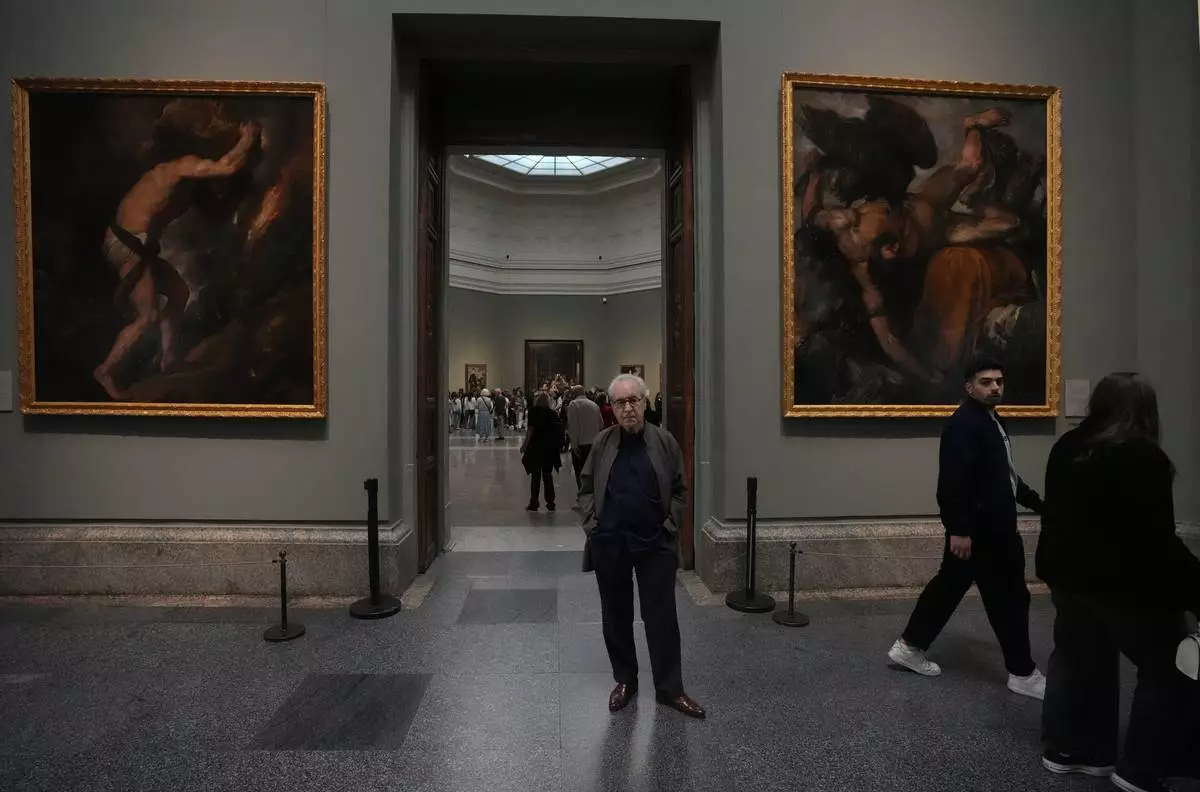
Novelist John Banville poses between Tiziano's 'Sisyphus' on left and Tityus on right at the Prado Museum in Madrid, Spain, Wednesday, Oct. 23, 2024. (AP Photo/Paul White)
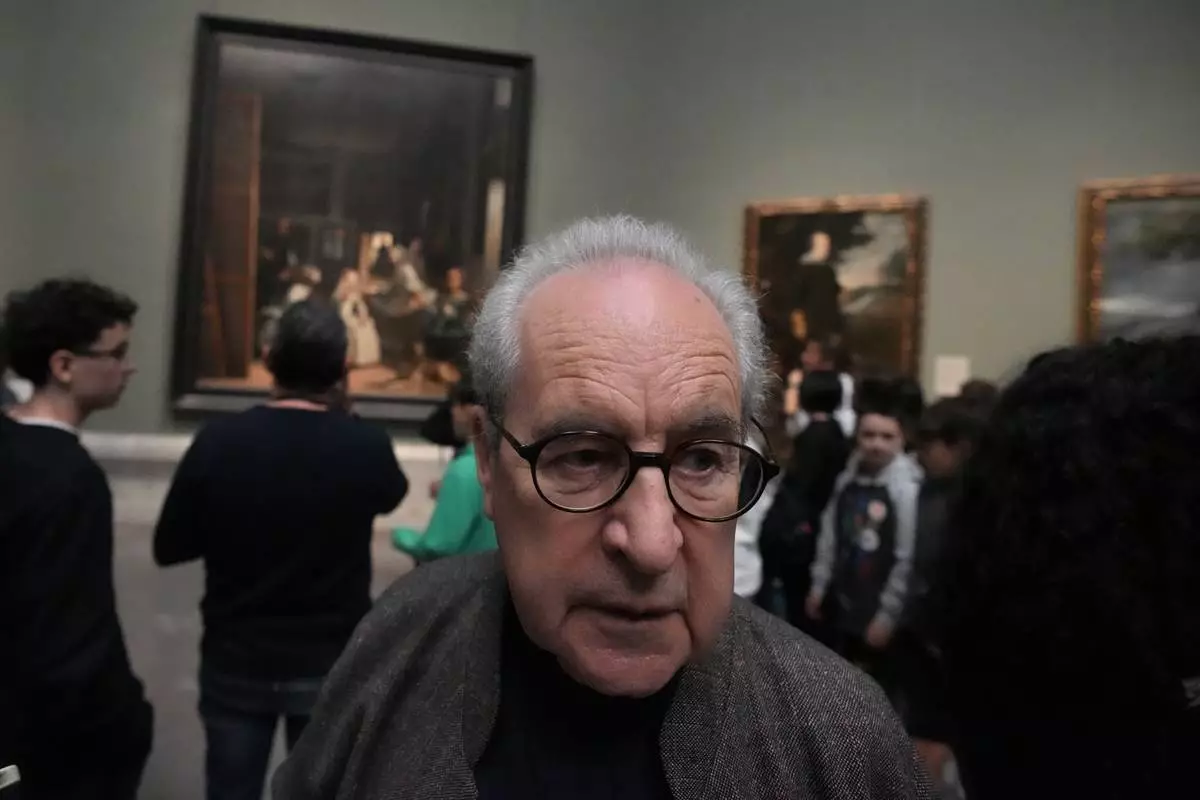
Novelist John Banville walks around looking at paintings including 'Diego Velazquez's 'Las Meninas' in the background at the Prado Museum in Madrid, Spain, Wednesday, Oct. 23, 2024. (AP Photo/Paul White)
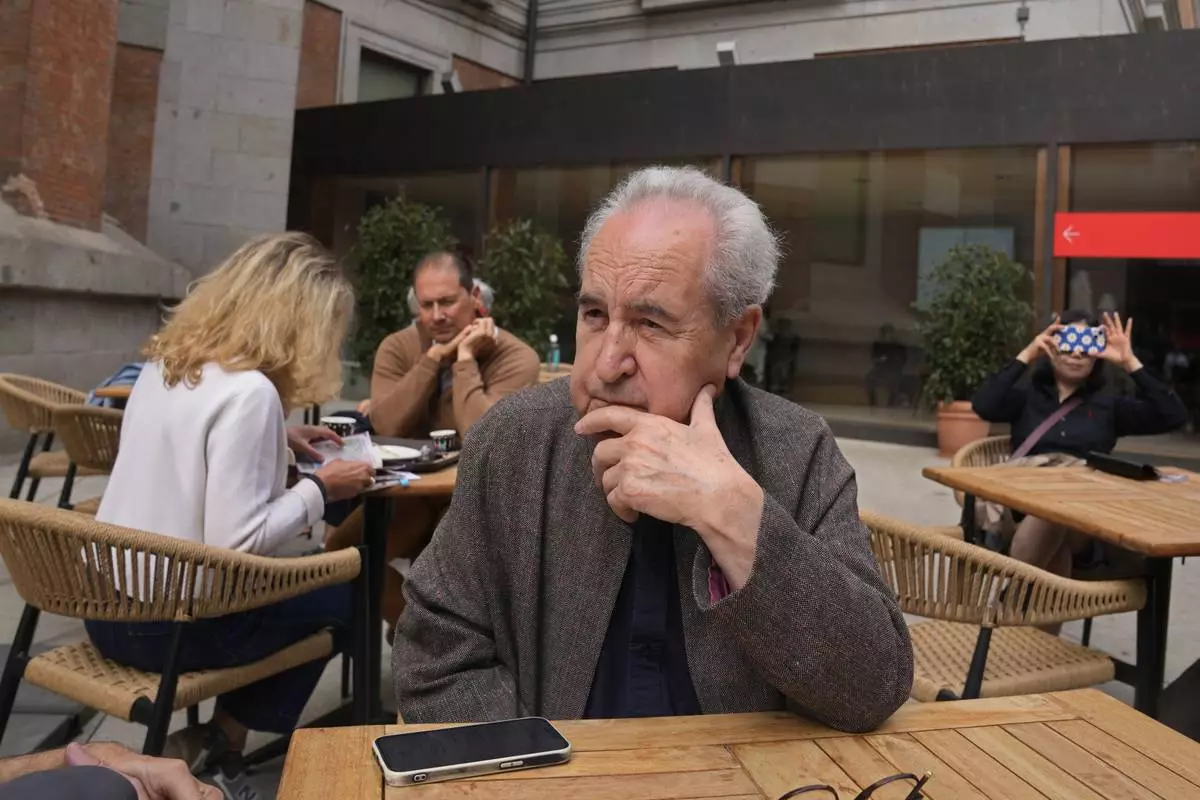
Novelist John Banville speaks during an interview with The Associated Press at the Prado Museum in Madrid, Spain, Wednesday, Oct. 23, 2024. (AP Photo/Paul White)
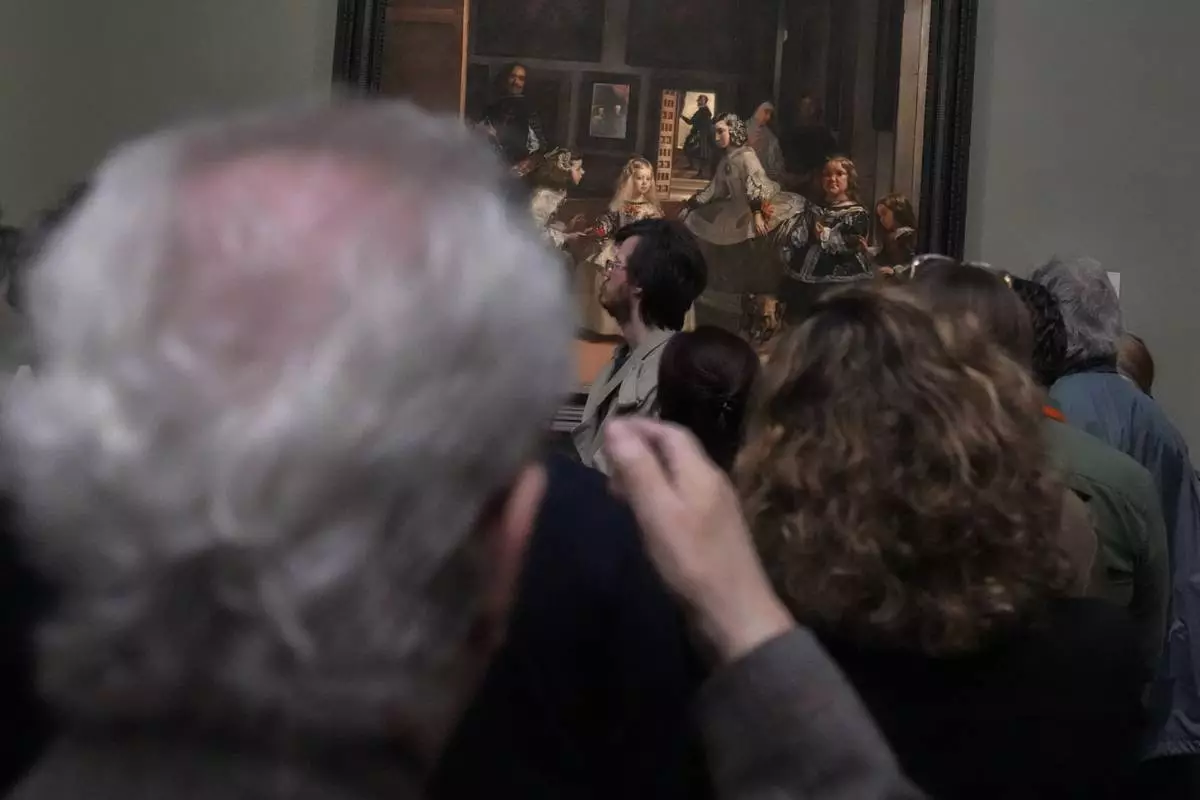
Novelist John Banville looks at 'Diego Velazquez's 'Las Meninas' at the Prado Museum in Madrid, Spain, Wednesday, Oct. 23, 2024. Banville has enjoyed unlimited access to Madrid's great El Prado museum for the past month as its latest writer-in-residence. (AP Photo/Paul White)
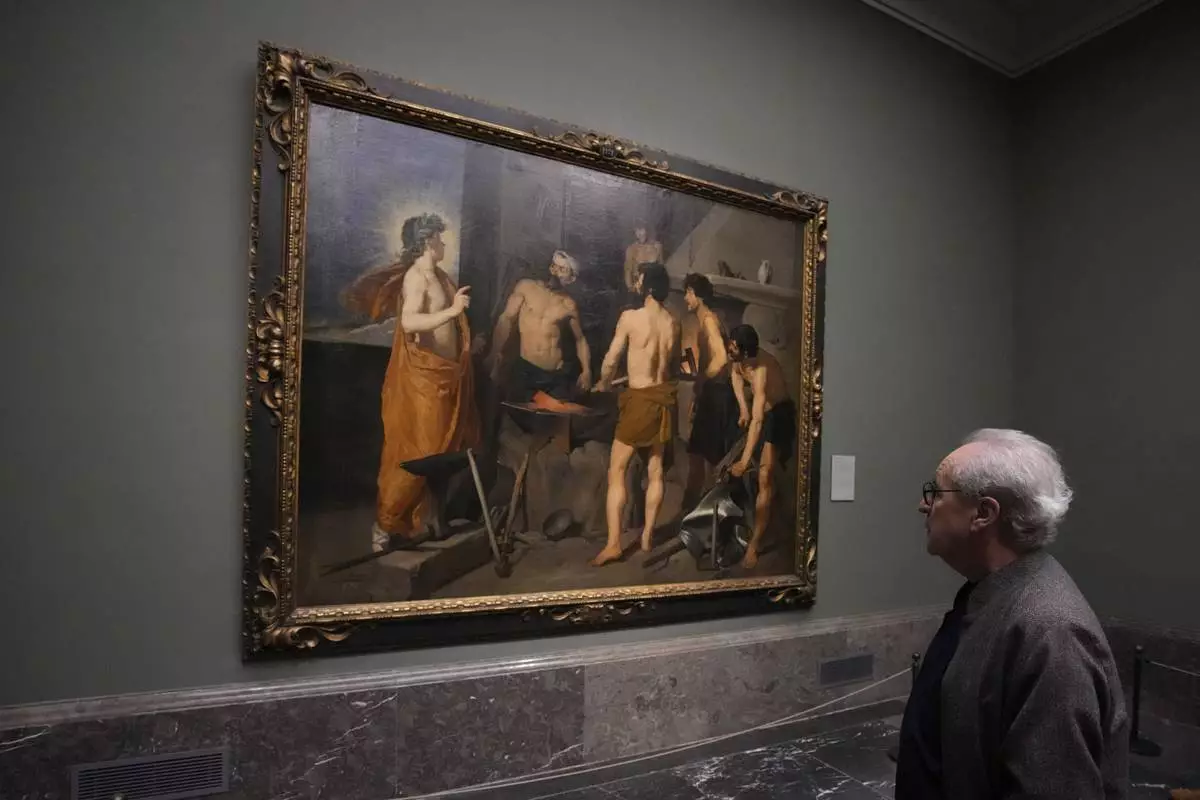
Novelist John Banville looks at Diego Velazquez's 'Vulcan's Forge' at the Prado Museum in Madrid, Spain, Wednesday, Oct. 23, 2024. (AP Photo/Paul White)
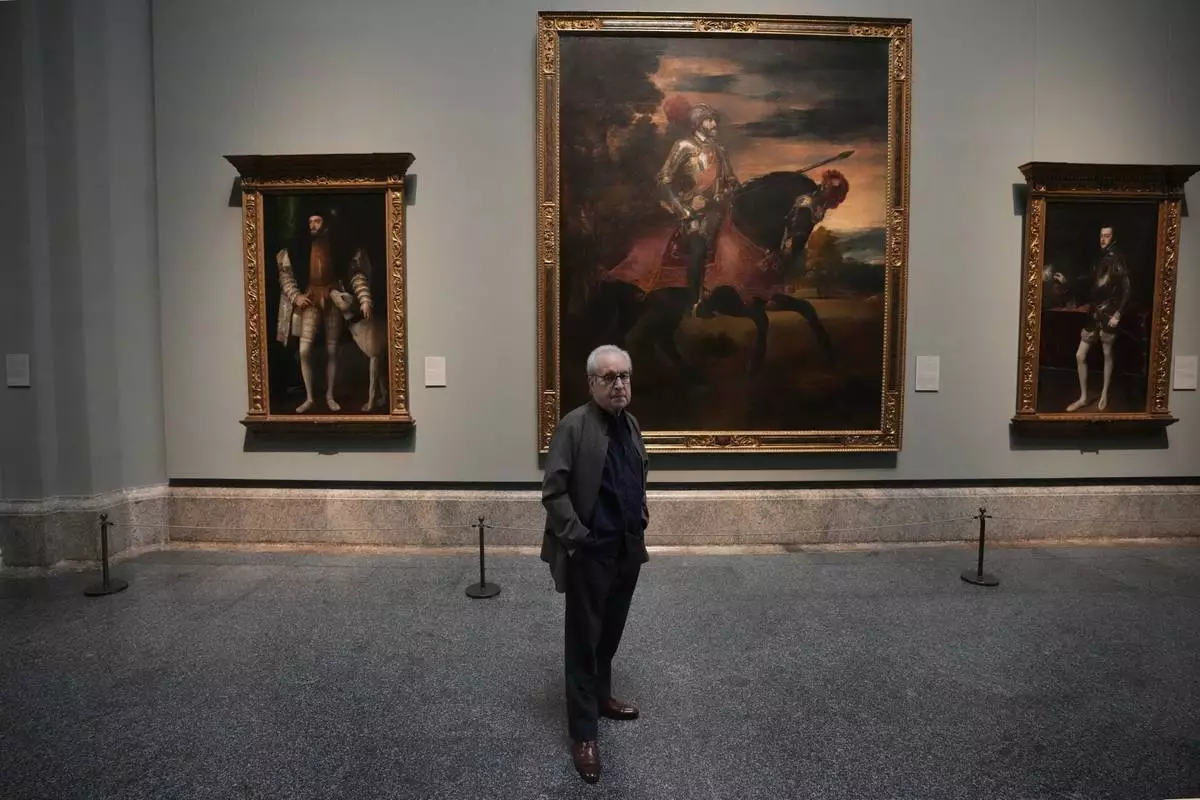
Novelist John Banville poses in front of Tiziano's 'The Emperor Charles V at Muhlberg' at the Prado Museum in Madrid, Spain, Wednesday, Oct. 23, 2024. (AP Photo/Paul White)
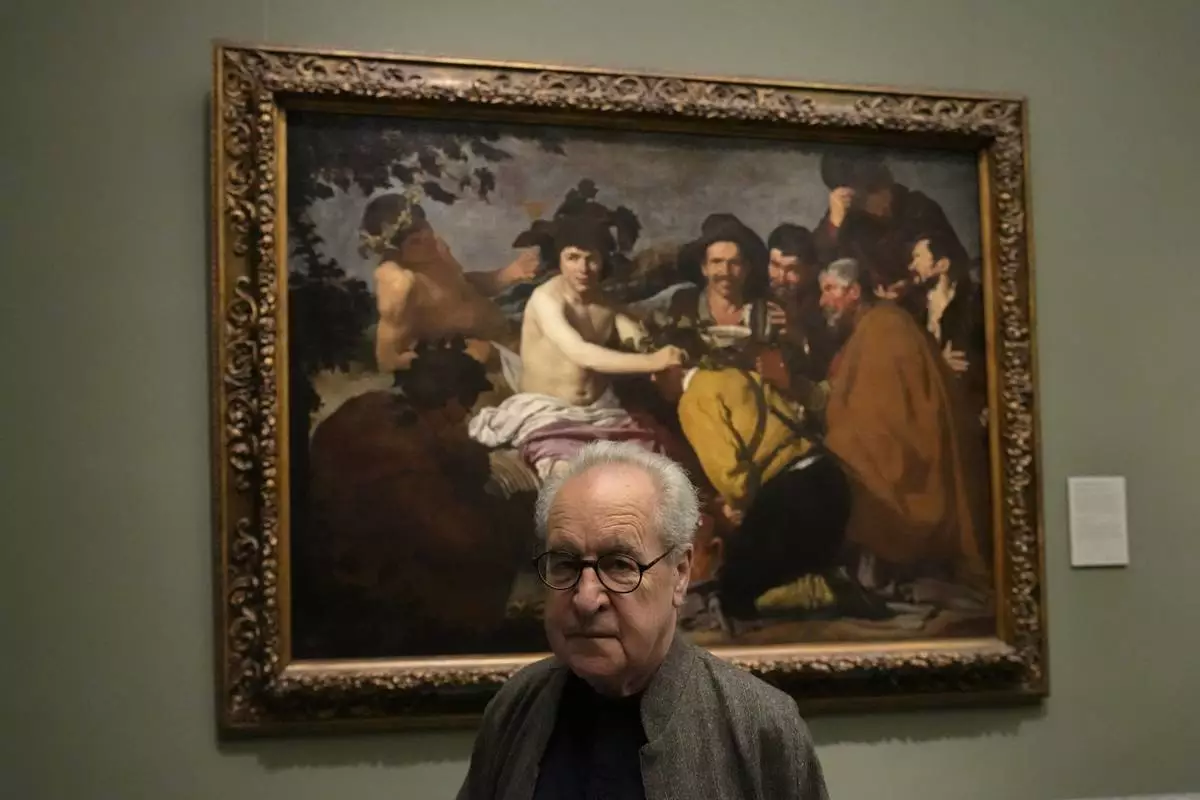
Novelist John Banville poses by Diego Velazquez's 'The Feast of Bacchus' at the Prado Museum in Madrid, Spain, Wednesday, Oct. 23, 2024. (AP Photo/Paul White)
Travelers who waited until the last day to make their Thanksgiving holiday treks need to be prepared for busy highways and the most crowded day yet this week at the nation's airports.
The Transportation Security Administration expected to screen 2.9 million people on Wednesday and more than 3 million Sunday, when many holiday revelers plan to return home.
Air travelers had reason to give thanks — only a couple dozen U.S. flights had been canceled by late morning on the East Coast, according to FlightAware.
However, more than 1,000 flights were running late, reflecting the tendency toward tardiness that is becoming normal at U.S. airlines. Airlines were averaging more than 4,500 late flights per day since last weekend, and Wednesday's count was likely to approach or surpass that number by nightfall.
Wednesday afternoon was expected to be the worst time to travel by car, according to forecasters. Drivers headed out of town will be mixing with commuters unlucky enough to be working on the day before the holiday.
Accidents compounded the heavy traffic. A dump truck that struck a bridge over Interstate 95 in Delaware closed the highway for several hours, according to the Delaware Department of Transportation.
An Arctic blast in the Midwest and wet weather in the Eastern U.S. could disrupt travel over the next several days.
From Wednesday into early Thursday, mixed precipitation was expected to stretch from northern Arizona through the Plains and upper Midwest into Pennsylvania, New York and parts of New England, according to the National Oceanic and Atmospheric Administration. A chilly, sloppy mix was expected to linger into Saturday in parts of the Northeast.
Forecasters expect clear weather over most of the western two-thirds of the country on Thursday and Friday, but rain and possibly thunderstorms are predicted for the Southeast, which could raise the risk of flight disruptions.
Auto club and insurance company AAA predicted that nearly 80 million Americans would venture at least 50 miles from home between Tuesday and next Monday, with most of them will traveling by car.
Drivers should get a slight break on gas prices. The nationwide average price for gasoline was $3.07 a gallon on Wednesday, down from $3.25 at this time last year.
Airfares, however, are about 4.1% higher than they were a year ago, according to government figures.
The Transportation Security Administration expected to screen 18.3 million people at U.S. airports during the same seven-day stretch. That would be 6% more than during the corresponding days last year but fit a pattern set throughout 2024.
The TSA expects the biggest crowd on Sunday, which could break the record of 3.01 million set on the Sunday after the July Fourth holiday.
TSA Administrator David Pekoske said his agency is ready, with its highest staffing ever, but an ongoing shortage of air traffic controllers at the Federal Aviation Administration could cause flight delays.
FAA Administration Administrator Mike Whitaker said last week that his agency likely will use special measures to deal with shortages at some facilities.
“If we are short on staff, we will slow traffic as needed to keep the system safe,” he said.
In the last two years, similar measures have slowed down flights in New York City and Florida.
The FAA has long struggled with a shortage of controllers that airline officials expect will last for years, despite the agency's lofty hiring goals.
TSA says it’s OK to bring turkey, stuffing and other favorite holiday foods through airport checkpoints, although liquids such as gravy and cranberry sauce can’t exceed 3.4 ounces.
Just because you can carry it on the plane doesn’t mean you should.
“Especially when it comes to gravy, I wouldn’t want that in my carry-on luggage, and I definitely wouldn’t want it in my checked baggage,” TSA spokesperson Lorie Dankers said.
Thanksgiving brings out infrequent flyers, and they often have questions about what they can bring on the plane. The TSA app and website have lists of items that are banned or restricted.
Wednesday afternoon was expected to be the worst time to travel by car before Thanksgiving, but it will be smooth sailing on highways Thursday, according to transportation analytics company INRIX.
On the return trip, the least-congested times to drive will be before 1 p.m. Sunday and before 8 a.m. or after 7 p.m. Monday, the company said.
In metropolitan areas like Boston, Los Angeles, New York, Seattle and Washington, “traffic is expected to be more than double what it typically is on a normal day,” INRIX transportation analyst Bob Pishue said.
Kathy McCormack in Concord, New Hampshire, Sean Murphy in Oklahoma City and Mike Householder in Romulus, Michigan, contributed to this report.

Travelers wait for their ride at O'Hare International Airport in Chicago, Tuesday, Nov. 26, 2024. (AP Photo/Nam Y. Huh)

Travelers walk through Terminal 3 at O'Hare International Airport in Chicago, Tuesday, Nov. 26, 2024. (AP Photo/Nam Y. Huh)

Travelers rush to their gate at Hartsfield-Jackson Atlanta International Airport, Tuesday, Nov. 26, 2024, in Atlanta. (AP Photo/Olivia Bowdoin)

Travelers move through the B Concourse at the Hartsfield-Jackson International Airport, Tuesday, Nov. 26, 2024, in Atlanta. (AP Photo/Carolyn Kaster)
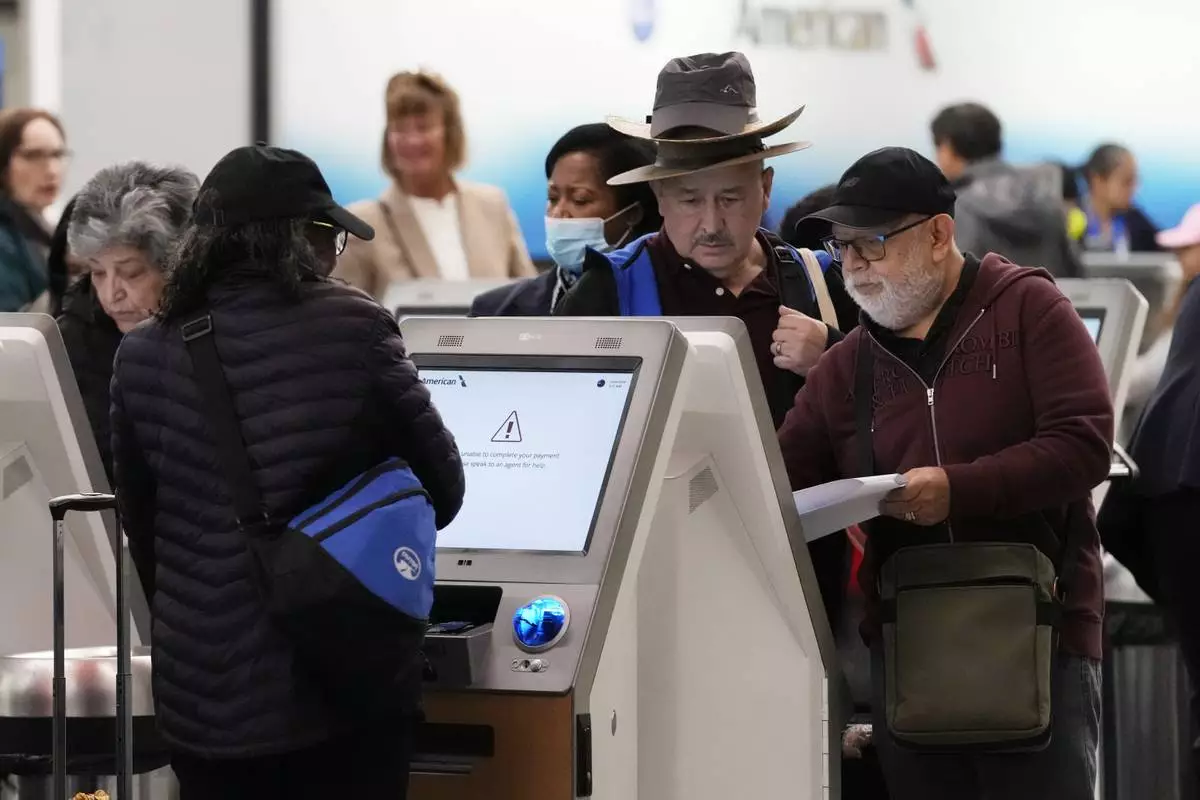
Travelers check their tickets at O'Hare International Airport in Chicago, Tuesday, Nov. 26, 2024. (AP Photo/Nam Y. Huh)

A Delta Airlines flight departs Hartsfield-Jackson International Airport, Tuesday, Nov. 26, 2024, in Atlanta. (AP Photo/Carolyn Kaster)

Delta Airlines planes are loaded along the B Concourse at the Hartsfield-Jackson International Airport, Tuesday, Nov. 26, 2024, in Atlanta. (AP Photo/Carolyn Kaster)

Passengers wait to check-in at Miami International Airport, Tuesday, Nov. 26, 2024, in Miami. (AP Photo/Marta Lavandier)

A traveler walks to his gate at Miami International Airport, Tuesday, Nov. 26, 2024, in Miami. (AP Photo/Marta Lavandier)

Passengers wait to check-in at Miami International Airport, Tuesday, Nov. 26, 2024, in Miami. (AP Photo/Marta Lavandier)

Travelers walk through Terminal 3 at O'Hare International Airport in Chicago, Tuesday, Nov. 26, 2024. (AP Photo/Nam Y. Huh)

Travelers wait to be wheeled to their gates at Hartsfield-Jackson Atlanta International Airport, Tuesday, Nov. 26, 2024, in Atlanta. (AP Photo/Olivia Bowdoin)

Travelers walk through Terminal 3 at O'Hare International Airport in Chicago, Tuesday, Nov. 26, 2024. (AP Photo/Nam Y. Huh)

Travelers pull suitcases as they walk toward a terminal, Monday, Nov. 25, 2024, at Boston Logan International Airport, in Boston. (AP Photo/Steven Senne)

Travelers wait at Hartsfield-Jackson International Airport, Friday, Nov. 22, 2024, in Atlanta, as the Thanksgiving travel season kicks off. (John Spink/Atlanta Journal-Constitution via AP)

Travelers prepare to board aircraft near a holiday decoration, top, Monday, Nov. 25, 2024, at Boston Logan International Airport, in Boston. (AP Photo/Steven Senne)

FILE - As the Thanksgiving holiday approaches, travelers walk through Reagan Washington National Airport in Arlington, Va., on Nov. 22, 2023. (AP Photo/Susan Walsh, File)

FILE - In this photo made with a long exposure, motor vehicles move along Interstate 76 ahead of the Thanksgiving Day holiday in Philadelphia, Nov. 22, 2023. (AP Photo/Matt Rourke, File)









